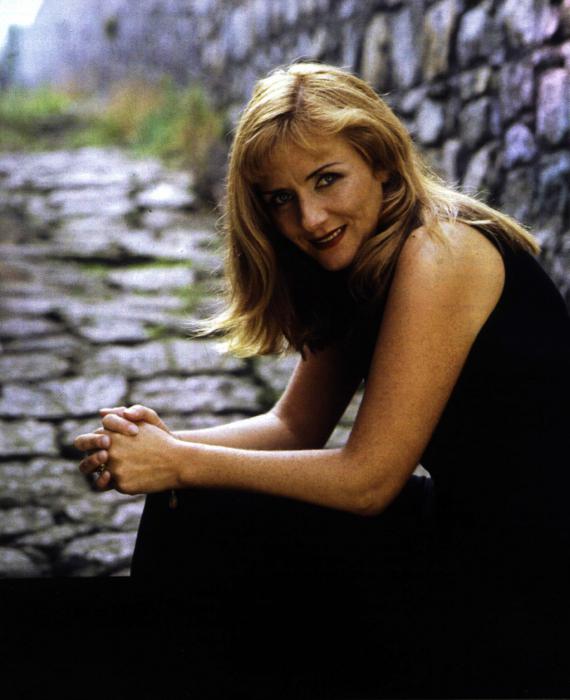I was a Wife and Mother who Drank to Relax
FRANCES BLACK was a wife and mother who liked a drink, as she often told her family, to help her get to sleep in the evening. Until, that is, she happened to read a short piece in a newspaper written by a woman whose drinking mirrored hers exactly — and who had come to realise she was an alcoholic.
"I was stunned," remembers Frances. "This woman talked about drinking when she got in from work in the evening, going out at the weekend and drinking as many as 10 pints in a night and always calculating at the back of her mind where the next pub might be.
"What really caught me was that she wasn't drinking vodka in the morning, she was drinking beer in the evening like me, and I had always thought that alcoholics were people who drank the moment they got up.
"I sometimes look at what my life might have been if I hadn't read that article. I think I might have lost my children Eoghan and Aoife and the friendship of my husband. Worst of all, I would have been bitter about life and all the lost chances. I think that bitterness is where alcohol abuse leads for every alcoholic. I can't imagine a worse fate." Frances, the youngest member of the musical Black Family and sister of the world-famous Mary Black, is now a solo singer in her own right. She has been voted Ireland's number one female singer. It was not, however, the pressure of showbusiness which fuelled her drinking.
Now 38 and teetotal for 10 years, her addiction to alcohol had begun long before she joined her family on stage, when she was just 16 years old.
This, she says, is why she is so keen to talk about the problem. "I hope it will help someone else in the way that anonymous woman helped me. What happened to me is typical of so many women.
"First I was a shy teenager and then I was a mother and a wife too young — at 19 — and I ended up using alcohol as an escape from how bad I felt about myself. I think this is true for far more women than many of us realise. Few people really think of how lonely being a mother can be, and that was certainly part of it for me. I also think every woman can identify with the uncertainty we all feel about ourselves as teenagers.
"I was quite a heavy girl and I felt terrible about the way I looked. I withdrew into myself and then, since most of us started drinking at about 16, began to use alcohol as a way of making myself sociable.
"I was just one of those people who got addicted to it, although I didn't realise it until I was in my 20s and decided to give it up for a while. I lasted just 10 days and it was torture — although even then I didn't get the message."
She smiles as she recalls: "I finally rang the clinic mentioned in this newspaper article and I remember saying several times that I wasn't an alcoholic, I just thought I had a bit of a problem.
"When I filled in the questionnaire, the counsellor looked at it and told me there was no question that I was.
But it was only after I'd gone into treatment that I began to see it myself.
"Thinking back, we'd go into the mountains for the day with the children and all I'd be thinking about was where the nearest pub was."
Only 30 years ago, a woman on her own would have been refused service in most pubs and she would certainly have been asked to leave if she had tried to drink from a pint glass. Equality, for those women with a predisposition to become addicted to alcohol, has meant the freedom to damage their health more quickly than men who drink too much.
RESEARCH shows that women's livers are far more susceptible to large amounts of alcohol than those of men who drink the same amount. Alcohol also accelerates the loss of brain cells, something to which women are more prone because of their hormonal make-up. The result is that women alcoholics tend to lose coherence and memory earlier than their male counterparts.
Added to these factors is the problem that admitting to alcoholism still seems to be regarded as more of a stigma for women than for men. "Mothers, in particular, aren't supposed to be alcoholics," says Frances, "which is why it seems so important to me that I am open and honest about my addiction. It might give another woman out there the courage to admit to herself that she has a problem too — the first and the biggest step.
"I was very lucky. My children, who are now 15 and 17, tell me that they don't recall my drinking — although I know there were nights when I didn't wake up when they called me because I'd gone to bed drunk. Although years were wasted, not too much damage was done."
Frances went to the rehabilitation centre three nights a week for 15 months. She had split with her husband the year before, although that was unconnected with her problem.
"We had married young and we grew apart," she said, "but we are still friends." She is now in a relationship with her manager Brian.
Frances, who is touring Britain next month to coincide with the release of her new album, says: "Ultimately, when my singing career took off, I had the strength to cope with the highs and lows without a drink. But I would like one day to meet this woman and thank her. The words she wrote changed my life."

